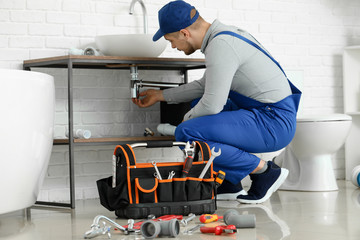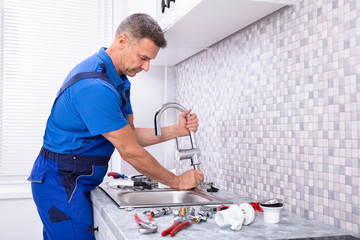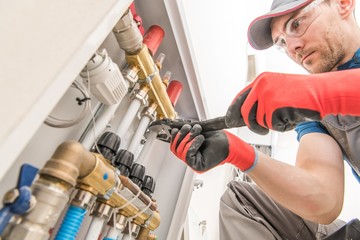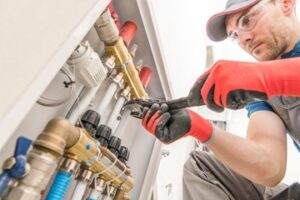Plumbing systems take away waste water, supply freshwater, and regulate indoor climate through pipes, taps, valves, and fixtures. Plumbers install, repair, and maintain these vital systems in homes and commercial spaces.
They must have a strong understanding of building codes and regulations, and be comfortable with interpreting blueprints and technical drawings. They also need to be physically fit and able to work in tight spaces.
When a tree grows too close to your sewer line, its roots can cause all sorts of problems. These include clogs and major damage to the pipes. In some cases, the roots can break through the pipe itself. In this situation, sewage will backup into your home and create a lot of unpleasant smells. A plumber can clean out the damaged pipe and prevent future occurrences of this nature.
The type of tree and how close it is to the sewer line also influences whether or not it causes problems. Some trees have very invasive root systems, while others are less likely to damage pipes. Ultimately, it is up to you to decide which trees are planted near your property.
One of the most common ways that tree roots cause problems is by penetrating through the wall of a sewer pipe. As the roots search for water and nutrients, they can use their strength to expand through any cracks in the wall. This kind of damage can be costly for homeowners, as it usually requires professional help to fix.
Other ways that tree roots can cause problems is by blocking the flow of wastewater. This can lead to clogs and overflowing sinks. In extreme cases, the roots can break through the pipe and cause a massive leak that will damage your home.
If you have a sewer problem, it is important to call a plumber right away. An experienced plumber can evaluate the damage, remove any problematic roots and repair the sewer line. This can save you a lot of time and money in the long run.
You can help to prevent the problem of tree roots damaging your sewer lines by planting them well away from the pipes. Also, ensure that the soil is nutrient-rich and well-loosened before planting any trees. Also, try to plant trees that do not need a lot of water, such as serviceberry or smoke. If you need to plant a fast-growing tree, such as willows or American elm, try to keep it at least 30 feet away from the sewer line.
Leaks
One of the most important jobs for plumbers is detecting and fixing leaks in sewer lines. A leaking sewer pipe can cause massive water damage to property and expose homeowners to costly repair bills. If left untreated, a leaking sewer line can also contaminate the soil and water supply, creating health hazards for residents. Fortunately, there are ways to prevent and detect a sewer line leak.
A common sign of a sewer line leak is a foul smell that doesn’t seem to have any identifiable source. This is caused by bacteria and other waste seeping through the cracked or damaged pipes into your home. Another warning sign is unexplained puddles or wet spots in your yard, especially when it hasn’t rained recently. Wet areas near your home’s foundation are also a sign of a sewer leak.
Leaking sewer pipes aren’t just an inconvenience; they can also lead to major problems like flooding, structural damage, and hazardous mold and mildew. Taking steps to check for signs of a leak on a regular basis can help you catch the problem early and avoid extensive repairs.
There are a few things that can cause a sewer leak, including ground movement, tree roots, and stress on the pipes from excessive use or blockages. To prevent these issues, ensure that all drains are used properly and that non-degradable items, such as diapers, wipes, paper towels, and cooking grease, are not flushed down the drains. You should also avoid planting trees or shrubs too close to the sewer line, as their roots can grow into and break the pipes.
If you think you have a leak, turn off your home’s water supply and call a plumber immediately. You can also take precautionary measures to protect your home, such as installing a backwater valve and sump pump and having regular tree maintenance done by a professional.
Detecting sewer line leaks as soon as possible is essential for preserving the integrity of your home’s plumbing system and maintaining its value. Early detection through reliable inspection services and prompt action can save you money, time, and safeguard your home from serious damage and costly repair bills.
Damage
When it comes to keeping your home plumbing system in good condition, preventive maintenance goes a long way. It’s important to practice good habits, like never flushing anything other than toilet paper and human waste into drains. Paper towels, wipes, feminine hygiene products, grease, oil, and other solids can clog pipes and cause major plumbing problems. Harsh chemical cleaners should also be avoided as they can weaken pipes and cause them to break down over time.
Another important habit to cultivate is noticing the early signs of sewer line damage, such as sewage back-ups into sinks, bathtubs, and toilets. Foul odors around drains or in the yard, waterlogged or lush spots in the lawn, and slow-draining drains can indicate a blockage or a broken pipe that allows sewage to leak out into your home.
Regular professional checkups from your local plumber are an excellent way to keep your sewer line in good working order and avoid costly repairs. These professionals can use specialized tools and techniques to quickly identify and clear even the most stubborn drain clogs. They can also inspect for broken or cracked lines and recommend a course of action for fixing them before they become worse.
Some causes of sewer line damage are beyond your control, such as when the ground shifts underneath your property, causing pipes to crack or displace. But you can take steps to limit the risk by having tall vent pipes installed, staying alert to changes in the landscape beneath your home, and calling a pro when you notice signs of a problem.
As the cold weather sets in, you’ll want to be prepared for clogs and other unpleasant plumbing issues. By following some simple preventive measures, you can keep your sewer system in tip-top shape all winter long. Just remember to use a garbage disposal regularly, don’t put grease down your drains, and be sure to plant trees far enough away from your sewer line. With a little care, you’ll have a happy, healthy sewer system all year round. Thanks for reading! If you have questions about your plumbing system, contact Spotted Dog Excavating in Pleasantville today!
Maintenance
Plumbers perform a wide range of tasks to install, maintain, and repair plumbing systems. They use a variety of tools to inspect and diagnose problems, such as leaks or clogs, and then implement effective repairs. They also install and connect appliances like sinks, toilets, showers, and water heaters. In new construction projects, they work from blueprints and building codes to lay out piping and connect all fixtures and appliances.
While a high school diploma is usually enough to get started, further education and training can help plumbers advance in the field. A license is often required, and plumbers can earn their credentials through apprenticeship programs or through taking certification tests. Many states have established minimum qualifications that plumbers must meet before they can become licensed.
Some plumbers specialize in residential or commercial settings. Those who prefer residential settings focus on installing and maintaining pipes for homes, apartments, and other private dwellings. Their duties may include repairing leaks and clogs, installing faucets and toilets, and connecting laundry and dishwasher machines. They can also handle larger-scale plumbing installations for restaurants, hospitals, and factories.
Other plumbers primarily focus on maintaining existing systems. This requires them to inspect all aspects of the system, test pressure levels, locate blockages, and fit replacement parts such as valves or taps. They can also carry out more complex tasks such as power flushing central heating systems and replacing broken seals around baths and sinks. Additionally, plumbers who specialize in maintenance must be knowledgeable about best practices when it comes to water conservation and system maintenance. This type of plumber tends to be paid a higher salary than those who simply install and repair systems.


 The first step in becoming a plumber is earning a high school diploma or equivalent. After that, you must obtain the proper training. This can be achieved through a formal union or trade organization apprenticeship, a program at a technical or vocational school, or by working under a master plumber for a certain number of years. It is also possible to pursue education in the field of plumbing through online learning programs.
The first step in becoming a plumber is earning a high school diploma or equivalent. After that, you must obtain the proper training. This can be achieved through a formal union or trade organization apprenticeship, a program at a technical or vocational school, or by working under a master plumber for a certain number of years. It is also possible to pursue education in the field of plumbing through online learning programs.



 Plumbers at Plumbing typically undergo training through apprenticeship programs that last two to five years. They must understand building codes, regulations, blueprints, and physics. They also need to be able to interpret customer needs and provide advice. Installing plumbing systems in new homes or commercial buildings is one of the main services that plumbers offer. They can also replace old or damaged fixtures, such as faucets, bathtubs, shower heads, and water heaters. Their job is to ensure that the pipes are installed properly and that there are no leaks. They use advanced tools and equipment to complete their work safely and quickly. If you have a clogged drain or low water pressure, it is important to call a plumber right away. They will be able to fix the problem before it gets worse. A plumber can also help with other household issues, such as toilet repairs or garbage disposal problems. They can inspect your entire plumbing system to find the source of the issue and recommend the best solution. Leaking pipes can cause serious damage to your home or business if left unattended. They may also lead to mold growth, which can be dangerous for your health. Plumbing services can repair leaking pipes and prevent future damage by installing water leak detection devices. They can also recommend ways to reduce your water usage to save money on your utility bills. Another service that plumbing companies offer is sewer line repairs. These are more complex than regular plumbing services, and should only be done by experienced professionals. They can fix leaks and broken lines in your sewer system, as well as repair or replace garbage disposals and washing machines. They can even install whole-house water filtration systems to improve the quality of your water. Many people don’t realize how important their plumbing system is until something goes wrong with it. Plumbing services are responsible for keeping our water supply clean and safe, so we should be grateful to them for their hard work. Without them, we would have to deal with dirty water and flooded basements. So the next time you see a plumber, be sure to thank them for their hard work! You can also show your appreciation by donating to their charity of choice or buying them a cup of coffee.
Plumbers at Plumbing typically undergo training through apprenticeship programs that last two to five years. They must understand building codes, regulations, blueprints, and physics. They also need to be able to interpret customer needs and provide advice. Installing plumbing systems in new homes or commercial buildings is one of the main services that plumbers offer. They can also replace old or damaged fixtures, such as faucets, bathtubs, shower heads, and water heaters. Their job is to ensure that the pipes are installed properly and that there are no leaks. They use advanced tools and equipment to complete their work safely and quickly. If you have a clogged drain or low water pressure, it is important to call a plumber right away. They will be able to fix the problem before it gets worse. A plumber can also help with other household issues, such as toilet repairs or garbage disposal problems. They can inspect your entire plumbing system to find the source of the issue and recommend the best solution. Leaking pipes can cause serious damage to your home or business if left unattended. They may also lead to mold growth, which can be dangerous for your health. Plumbing services can repair leaking pipes and prevent future damage by installing water leak detection devices. They can also recommend ways to reduce your water usage to save money on your utility bills. Another service that plumbing companies offer is sewer line repairs. These are more complex than regular plumbing services, and should only be done by experienced professionals. They can fix leaks and broken lines in your sewer system, as well as repair or replace garbage disposals and washing machines. They can even install whole-house water filtration systems to improve the quality of your water. Many people don’t realize how important their plumbing system is until something goes wrong with it. Plumbing services are responsible for keeping our water supply clean and safe, so we should be grateful to them for their hard work. Without them, we would have to deal with dirty water and flooded basements. So the next time you see a plumber, be sure to thank them for their hard work! You can also show your appreciation by donating to their charity of choice or buying them a cup of coffee.